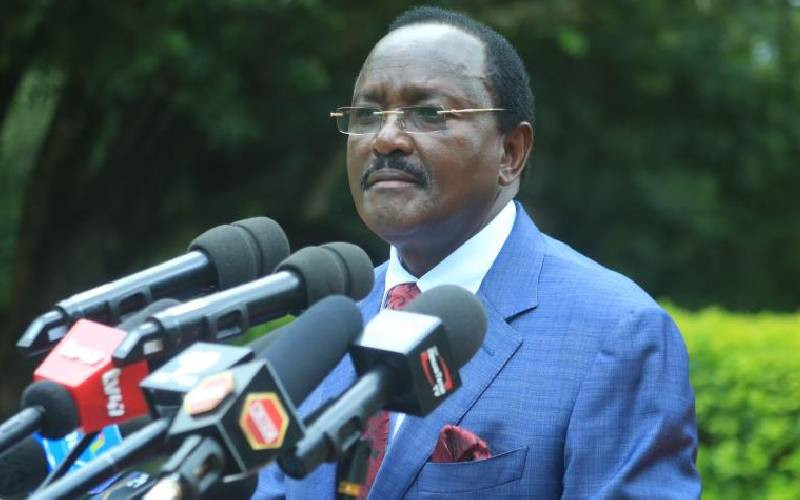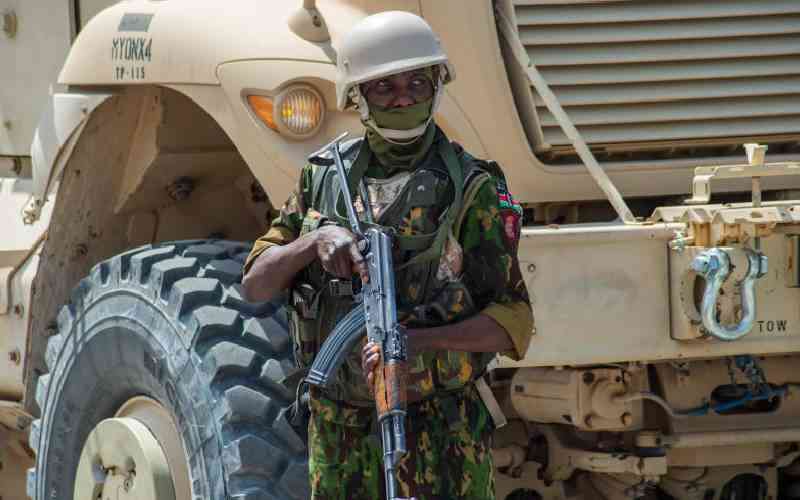 |
|
Former Vice President Kalonzo Musyoka joins residents of Tana River County in a dance when he toured the region on a conflict resolution mission. [PHOTOS: PHILIP MUASYA / STANDARD] |
By PHILIP MUASYA
Kitui, Kenya: Leaders from Kitui and Tana River counties have begun efforts to end long-standing differences between residents of the two neighbouring regions.
A team of 10 people has been formed to promote unity and foster co-existence among the residents after years of vicious conflicts over pasture and water.
The committee, which will be chaired by Mohamed Abdi Galgalo who unsuccessfully vied for the Tana River senatorial seat in the 2013 general election, has been tasked to develop practical ways of ending the boundary disputes and recommend ways of improving mutual trade between the two counties.
The team comprises five individuals from each of the two counties.
The conflict resolution mechanism was arrived at after former Vice President Kalonzo Musyoka toured Tana River recently in the company of Kitui Deputy Governor Penninah Malonza, Kitui East Member of Parliament Mutua Muluvi and Mombasa Senator Hassan Omar Hassan.
Kalonzo and the Kitui leadership had been invited by Tana River Governor Hussein Dado and County Women’s Representative Halima Ware to broker peace and address the Kitui–Tana River border dispute at Woldena.
Woldena was selected for the peace talks because it is where bloody inter-community attacks have been launched, resulting in deaths, theft of livestock and destruction of property.
The former VP said residents of both regions should not pass up the chance to promote peace.
Meaningful devolution
“We cannot achieve true devolution when neighbours fight. This calls for concerted efforts for the people of Kitui and Tana River to embrace peace. It is the only way we can achieve stability and meaningful development,” Kalonzo said.
Leaders from both sides have hailed the move as a milestone in resolving the decades-long conflicts which have pitted nomadic communities of Tana River that comprise the Orma, Wardei, Borana and Somali and the Kamba from Kitui.
Periodically, pastoralists from Tana River cross over to Kitui and make away with thousands of livestock, destroying farms in their wake as residents flee in fear of attacks from bandits.
Conflict zones such as Tseikuru in northern Kitui and Mutha in the south are common targets for the attackers, particularly along Thua River. In the past, police have used force to drive the invading herders back to Tana River.
The Kitui leadership has also accused Tana River residents of illegal charcoal trade, particularly around the South Kitui Game Reserve, where several people have been arrested and prosecuted at the Mutomo law courts.
Stay informed. Subscribe to our newsletter
Residents of both counties are keen to see how the team will address conflicts at volatile areas in the northern and southern boundaries where incessant conflicts flare up every year as communities from both counties claim ownership of grazing fields and water sources near their common border. Mbangale shopping centre, mostly frequented by the Orma, is a common area of conflict. Kalalani, inhabited by both Ormas and Kamba at the southern end, is also a perennial conflict zone.
Even though the law allows Kenyans to live anywhere in the country, the Kitui County leadership has been angered by a move by some Tana River County leaders to construct schools in areas they claim to be in Kitui. They say these “annexations” amount to acts of aggression.
The disputed primary schools, Enyali and Kalalani in Mutomo District, have 10 permanent classrooms; while Mwanzele Primary School in Mwingi East District has five.
Boundary demarcation
The three schools were reportedly built five years ago by the Bura and Galole people of Tana River using the Constituency Development Fund.
Kitui Governor Julius Malombe and his Tana River counterpart Dado promised to work towards proper demarcation of the boundary to address the protracted conflicts.
Kalonzo’s visit in Tana River presented the leaders with an opportunity to express their objection towards the move by the Jubilee administration to embark on the Galana Irrigation Scheme, arguing that two similar projects — Hola and Bura Irrigation Schemes — have not benefited locals.
They expressed fear that they may be displaced to make way for the Galana project.
Ms Ware, the Tana River County Women Represenative, says: “Hola and Bura Irrigation lands acquired from the residents have not benefited local people and now the pastoralists will have to search for additional pasture while outsiders enjoy the Galana Ranch. Authorities should first strengthen existing projects to ensure the locals reap maximum benefits before embarking on new ones.”
Kalonzo appealed to residents of Hola and Garsen to form co-operatives to enable them benefit from the massive Galana Irrigation Scheme.
 The Standard Group Plc is a
multi-media organization with investments in media platforms spanning newspaper
print operations, television, radio broadcasting, digital and online services. The
Standard Group is recognized as a leading multi-media house in Kenya with a key
influence in matters of national and international interest.
The Standard Group Plc is a
multi-media organization with investments in media platforms spanning newspaper
print operations, television, radio broadcasting, digital and online services. The
Standard Group is recognized as a leading multi-media house in Kenya with a key
influence in matters of national and international interest.
 The Standard Group Plc is a
multi-media organization with investments in media platforms spanning newspaper
print operations, television, radio broadcasting, digital and online services. The
Standard Group is recognized as a leading multi-media house in Kenya with a key
influence in matters of national and international interest.
The Standard Group Plc is a
multi-media organization with investments in media platforms spanning newspaper
print operations, television, radio broadcasting, digital and online services. The
Standard Group is recognized as a leading multi-media house in Kenya with a key
influence in matters of national and international interest.









